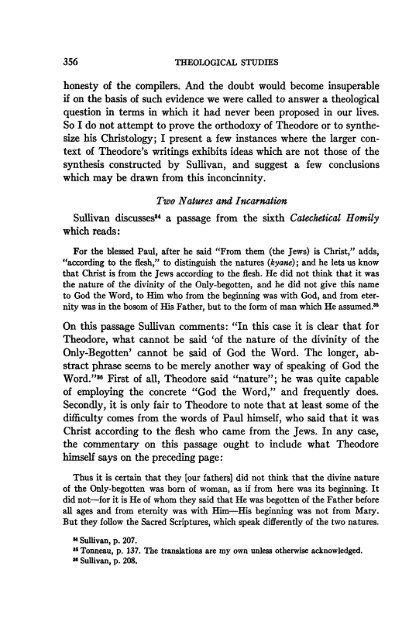ANNOTATIONS ON THE CHRISTOLOGY OF THEODORE OF ...
ANNOTATIONS ON THE CHRISTOLOGY OF THEODORE OF ...
ANNOTATIONS ON THE CHRISTOLOGY OF THEODORE OF ...
You also want an ePaper? Increase the reach of your titles
YUMPU automatically turns print PDFs into web optimized ePapers that Google loves.
356 <strong>THE</strong>OLOGICAL STUDIES<br />
honesty of the compilers. And the doubt would become insuperable<br />
if on the basis of such evidence we were called to answer a theological<br />
question in terms in which it had never been proposed in our lives.<br />
So I do not attempt to prove the orthodoxy of Theodore or to synthesize<br />
his Christology; I present a few instances where the larger context<br />
of Theodore's writings exhibits ideas which are not those of the<br />
synthesis constructed by Sullivan, and suggest a few conclusions<br />
which may be drawn from this inconcinnity.<br />
Two Natures and Incarnation<br />
Sullivan discusses 34 a passage from the sixth Catechetical Homily<br />
which reads:<br />
For the blessed Paul, after he said "From them (the Jews) is Christ," adds,<br />
"according to the flesh," to distinguish the natures (kyane); and he lets us know<br />
that Christ is from the Jews according to the flesh. He did not think that it was<br />
the nature of the divinity of the Only-begotten, and he did not give this name<br />
to God the Word, to Him who from the beginning was with God, and from eternity<br />
was in the bosom of His Father, but to the form of man which He assumed. 35<br />
On this passage Sullivan comments: "In this case it is clear that for<br />
Theodore, what cannot be said 'of the nature of the divinity of the<br />
Only-Begotten' cannot be said of God the Word. The longer, abstract<br />
phrase seems to be merely another way of speaking of God the<br />
Word." 36 First of all, Theodore said "nature"; he was quite capable<br />
of employing the concrete "God the Word," and frequently does.<br />
Secondly, it is only fair to Theodore to note that at least some of the<br />
difficulty comes from the words of Paul himself, who said that it was<br />
Christ according to the flesh who came from the Jews. In any case,<br />
the commentary on this passage ought to include what Theodore<br />
himself says on the preceding page:<br />
Thus it is certain that they [our fathers] did not think that the divine nature<br />
of the Only-begotten was born of woman, as if from here was its beginning. It<br />
did not—for it is He of whom they said that He was begotten of the Father before<br />
all ages and from eternity was with Him—His beginning was not from Mary.<br />
But they follow the Sacred Scriptures, which speak differently of the two natures.<br />
84 Sullivan, p. 207.<br />
35 Tonneau, p. 137. The translations are my own unless otherwise acknowledged.<br />
88 Sullivan, p. 208.
















